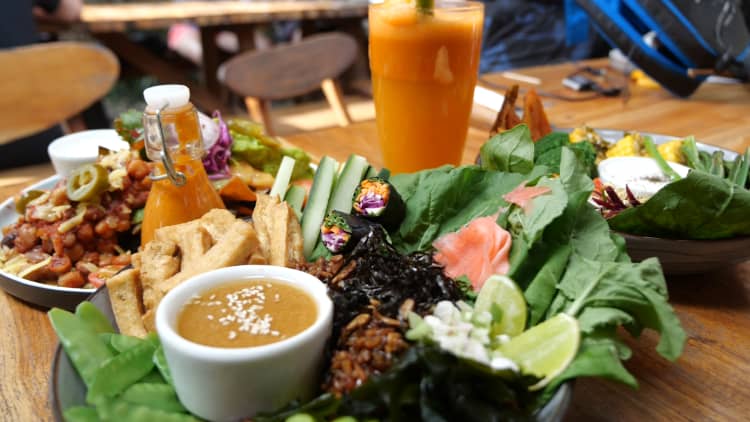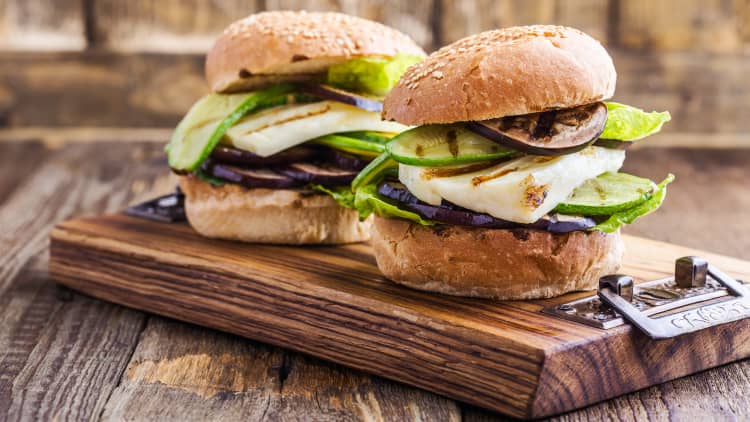From Beyond Meat going public to Burger King rolling out a plant-based burger, and Tyson Foods recently announcing plant-based nuggets, one thing is becoming clear: a meatless revolution is upon us.
To see where the future of food could potentially be heading, I tested out a vegetarian diet for three weeks — quite the challenge for someone who includes meat in nearly every meal.
Adding to the difficulty of the task, it took place in a part of the world where meat consumption is high: Asia.
14 days on the island of Bali
The first two weeks were spent in a surfer and yoga town — Canggu — on the island of Bali, Indonesia. It was surprisingly easy as vegetarian and vegan restaurants were everywhere I looked.
In fact, plant-based food is so popular in this town that many joints would advertise: "Try our vegan burger!" or "Now offering vegan Pad Thai!"
It has created an opportunity for business owners like Sophia Made, who opened Plant Cartel, a fully vegan fast-food restaurant. Although, unlike many, you'd never know it's vegan from the outside or the menu board.
"We're happiest when a lot of people come in and they don't even really realize what they're eating is plant-based," Made told CNBC. "You know, we're not trying to trick people."
Made wants to change the perception that such food is just for vegans.
"That stigma of tofu vegan food is not here," she said. "We wanted to normalize plant-based food and encourage both omnivores and vegans to come and eat here."
Many of the comfort food staples like burgers and hot dogs are created using seitan — a popular meat replacement made out of wheat gluten. At Plant Cartel, cheese is made from carrot and potato, and bacon is produced from eggplant.
Made hopes that by creating everyday staples out of plants, it will inspire people to rethink the amount of meat they need to consume.
While many of the meals I ate during my trial were salads and protein bowls, a place like Plant Cartel certainly made it easier to consume a vegetarian and vegan without feeling deprived.
Two weeks into the experiment — while still having cravings to eat meat — I felt good and energetic nonetheless.
7 days in Hong Kong, a meat lovers' paradise
Next, I headed to Hong Kong — a city with one of the highest rates of meat consumption per capita — where I quickly discovered the options are much more limited.
In Hong Kong, many restaurants I visited didn't have any vegetarian options on their menu. When asked, however, some staff members would offer to swap out chicken or beef with tofu. There were also instances when an employee would mistakenly offer fish ball soup as an alternative to meat.
I also found that an average business lunch in Hong Kong often consists of pork or beef in most dishes, and quickly realized that this vegan lifestyle is going to take a lot more work in this city.
Manav Gupta, founder of Brinc, a venture capital firm, lives in the Asian city and has been a vegetarian his entire life.
"Meat today, has been presented as a product that makes you feel more like a man, more like a human, gives you more protein, it's nutritious," he said. "Whereas plant-based food is the food of the animals, it's the food that you should let the animals eat. And thus you should eat them," he said.
Gupta thinks that much of what people eat comes down to social acceptance.
"If you go out to a restaurant, if you're eating with your peers, they think that if you're eating vegan or veg[etarian], it's almost emasculating in many ways," he said. "So a lot of people choose to eat meat, or consume meat, even though they sometimes would be open to consuming the plant-based alternate."
The 'flexitarian' diet
At the end of three weeks, I soon began eating meat again, but not as frequently as before the experiment started.
Naturally, there's even an unofficial label for that kind of diet, referred to as 'flexitarian' — someone who eats primarily plant-based, but occasionally eats meat, too.
While global meat consumption is on the rise, driven by countries such as China and Brazil, some indications show its consumption has reached a peak in countries including the U.S. and the U.K.
For now, however, only 5% of Americans identify as vegetarians according to a recent Gallop poll, a figure that has changed little since 1999.
So, perhaps the future of food isn't meatless, but less meat.




